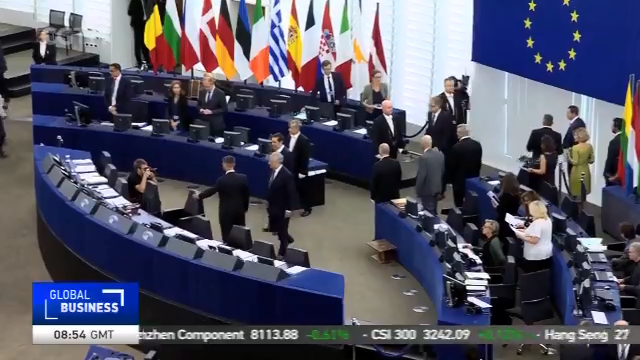
19:13, 14-Sep-2018
European Economy: Lessons from Europe help curb Italy's debt woes
Updated
18:52, 17-Sep-2018
03:16

The years of financial strife were felt deeply all across Europe but perhaps no more so than in Greece. A eurozone country that was pushed through a bruising eight-year austerity program. Mariam Zaidi takes a look back at Europe's financial crisis.
Crisis spilled over to European banks. But by late 2009, entire banking systems began to collapse in Iceland, Portugal, Italy, Ireland, Greece and then Spain. Eurozone countries couldn't bail out their banks because they couldn't even manage their own government debt. Something was needed to keep the Euro from collapse. In came new policies such as the Banking Union to strengthen the stability of big banks. And troubled economies were pushed through punishing bailout programs.
MARIA DEMERTZIS, DEPUTY DIRECTOR BRUEGEL THINK TANK "What we have achieved in the past ten years is like the equivalent to the speed of light. It is incredible what we have managed to achieve in Europe but it's not complete. But it is steps forward that really increase the robustness of the system – especially on the financial side. What we have prepared for are types of problems from the past."
Last month, Greece successfully concluded its debt bailout program. But after eight years of bruising austerity, this has left some people without their livelihoods, pensions or decent salaries, still lingers.
ALEXIS TSIPRAS GREEK PRIME MINISTER "For the first time since the crisis began, the sacrifices of our people had an effect. We've managed to have a fiscal consolidation, we did deep reforms and breaks with past, things that were taking place decades ago. We managed to go from the spiraling of the crisis back to economic growth."
VASILIS KATSARDIS, SYRIZA PRESS OFFICER EU PARLIAMENT "This model of neoliberalism is the reason why it took Greece eight years to come out of the programs and still not come out of the crisis. If Europe, the IMF, and Greek government from the beginning had taken a different route, just like the US by throwing the money at the problem, probably Greeks would have suffered far less."
Today Italy, the eurozone's third largest economy has been raising alarm bells with its national debt near 2.4 trillion. If it sparks a new European crisis, would the new banking system survive? And would Europe be able to bail it out?
MARIA DEMERTZIS, DEPUTY DIRECTOR BRUEGEL THINK TANK "It would be very difficult to save Italy in the same way that Greece was helped. Simply because it's a big country so the money it requires in proportional terms – if you compare the money given to Greece – if the same type of money needs to be given to Italy, it would be very difficult for Europe to find that money."
MARIAM ZAIDI CGTN BRUSSELS "Is a new financial crisis yet to come? Former British Prime Minister Gordon Brown warns that today's trade wars and disagreements over issues like climate change and nuclear arms have left us in a leaderless world. And that without international cooperation, getting out of another global financial crisis, may not be easily done. Mariam Zaidi CGTN Brussels."

SITEMAP
Copyright © 2018 CGTN. Beijing ICP prepared NO.16065310-3
Copyright © 2018 CGTN. Beijing ICP prepared NO.16065310-3